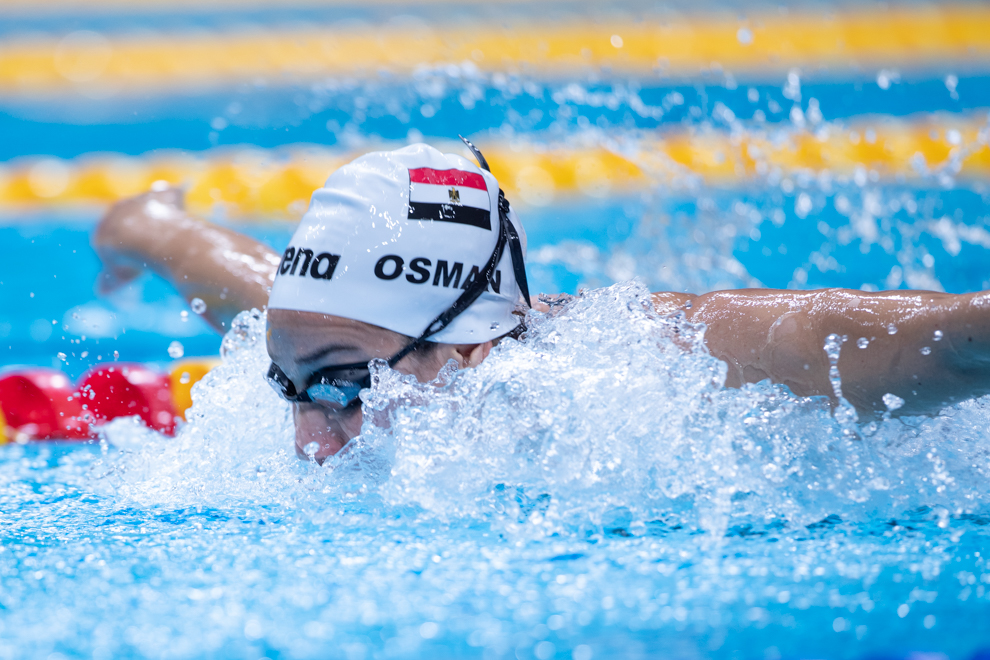When the novel coronavirus began to seriously spread throughout the United States in mid-March, professional and college swimmers alike around the country started to head home to be with their families as facilities shut down. But, for an international swimmer like Farida Osman, things were much more complicated.
Osman, a native of Cairo, Egypt, was training with the pro group at Virginia Tech when the COVID-19 pandemic started to seriously spread, and at first, they managed to continue training. When the VT pool was closed, coach Sergio Lopez found another facility for his athletes.
“What I admire about Sergio is that he is very resourceful; he managed to find us another pool, 40 min away,” Osman told SwimSwam. “We were so lucky that this facility had a pool and a gym and they were kindly allowing us to use it every day, despite the long commute.
“Following all coronavirus precautions, we had to be divided into two groups so we don’t exceed Virginia’s law of 10 people in one place. As a pro-group, we were all grateful to even train, even if it was only once a day, but was much better than not training at all.”
But after a week, that pool closed as well, and the members of the group started to head home. Osman wanted to do so as well, but there was one problem: Egypt had closed its borders and no flights were available.
“I had to make a few calls to try to find a solution,” said the two-time World Championship medalist. “I contacted the Ministry of Immigration and Expatriates Affairs, Consulate of Egypt in DC, Egyptair and the head of Egyptian Swimming Federation to see if there were any options.
“There were also a lot of other Egyptian swimmers training in the U.S., who were in the same situation as me, kind of stuck and unable to fly back home. After a lot of help and high demand, the Egyptian Government arranged for a specific Egyptair flight on April 2nd as an exception to bring us, and multiple other Egyptians in the U.S., back home.”
After getting back to her home country on April 3, Osman is now in a two-week quarantine in Marsa Alam, a small town in Southern Egypt, that will end on the 17th. Once that wraps up she’ll go to see her family in Cairo.
“I haven’t seen them since September so I’m really excited to be with them again,” she said. “I’m not sure how long I will be staying in Egypt, I’m just waiting to see how the situation in the US progresses how safe it will be to travel back during this pandemic. So I’m staying in Egypt until things get better.”
After the country helped her return home, the 25-year-old Cal grad has donated to the “Tahya Misr Fund” (translating to “Long Live Egypt Fund”), a public fund to support Egypt’s economy, small businesses and less fortunate people in general.
“It is an on-going fund where anyone from the general public can give donations to help Egypt during difficult economic times or otherwise,” she said. “One of the uses for these funds was also for aiding in the coronavirus relief. I felt the need to donate because I felt it was my duty to help my country in any way I can, just like it helped me when I was in need.”
To help Egypt overcome #COVID-19, I am proudly donating to #TahyaMisr fund! 🇪🇬 #donate pic.twitter.com/itdSHJ6n53
— Farida Osman (@FaridaOsman) April 6, 2020
In terms of how she feels about the Olympics being postponed for one year, Osman is keeping things positive despite the fact she was on fire in early 2020. In early March at the Des Moines Pro Swim, she swam the second-fastest 100 fly (58.00) and 100 free (55.01) of her career on no rest (tying her for 12th in the world for 2019-20 in the former).
“Postponing the Olympics is definitely the right decision because our health and safety is always the priority,” she said. “It’s just very hard for us to emotionally grasp this reality, but if swimming taught us anything, its to face all the obstacles that come in our way. And this is just another one.”
Osman is a two-time Olympian, making her debut in London before placing 12th in the 100 fly in Rio. She has also won bronze at back-to-back Long Course World Championships in the 50 fly, and was a six-time NCAA champion while competing for the Golden Bears from 2013-2017.
“I just keep thinking about all the hard work and sacrifices, but I know all of it has not gone to waste,” she said. “I’m choosing to stay positive, re-evaluate and keep moving forward. I see it now as another year to get better and stronger. It’s still the same goal, we are just re-adjusting the plan.”
